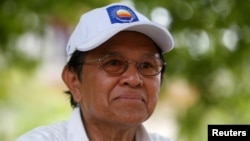Cambodian community activists from the United States and Canada will gather in Washington, DC, Saturday to protest the Cambodian government’s unwillingness to make peace with the country’s banned opposition party.
Demonstrators are demanding the release of the Cambodia National Rescue Party president, Kem Sokha, who was detained on treason charges in September 2017 and remains under house arrest in Phnom Penh.
They are also calling for all politically motivated charges against other CNRP officials and activists to be dropped and the CNRP, which was banned two months after Sokha’s arrest, to be reinstated.
The demonstration is being organized by a CNRP offshoot, the Cambodia National Rescue Movement, which was founded by the CNRP’s former president Sam Rainsy and has been labeled a “terrorist” movement by the Cambodian government.
“I’ve observed that the government does not seem to soften their heart or position,” said Ratana Seng, a protest organizer from New Jersey.
The ruling Cambodian People’s Party of Prime Minister Hun Sen won a landslide victory in a general election in July following the CNRP’s dissolution. Independent media outlets, civil society groups and activists have also been targeted by the courts and government bodies.
The United States and European Union have responded by threatening to remove Cambodia from preferential trading schemes and by placing sanctions on senior officials they say are responsible for human rights abuses and the democratic decline.
Hun Sen recently threatened the EU, saying a decision to remove Cambodia from current trade arrangements would “make the former opposition dead”.
Phay Siphan, government spokesman, said Cambodia “cannot follow the wishes of foreign countries.”
Under international pressure, the government has amended the political parties law to allow 118 former CNRP officials who were banned from political activities for five years when the party was dissolved to return to political life if they “apologize” to the prime minister.
Two officials have so far taken up the offer: Kong Korm, a former party adviser, and his son, Kong Bora, a former lawmaker.
“It’s simply a decoy that does not follow the international community’s conditions,” said Seng.
US Senator Patrick Leahy said that Cambodia had forgotten what the “image of democracy” was.
“There is nothing that’s satisfying because the government doesn’t seem to listen to any advice,” said Chendavy Vann, an activist from Vancouver, Canada. “They only focus on the idea of their group, nepotism, and dictatorship…they are only afraid of losing power. They don’t pay attention to the concerns of the people.”
